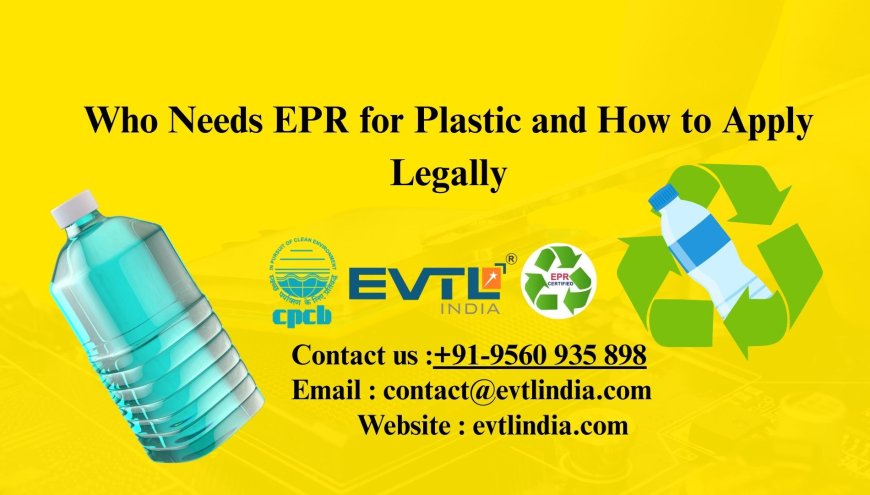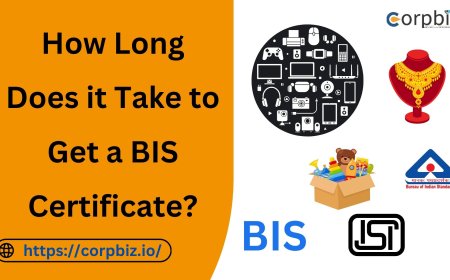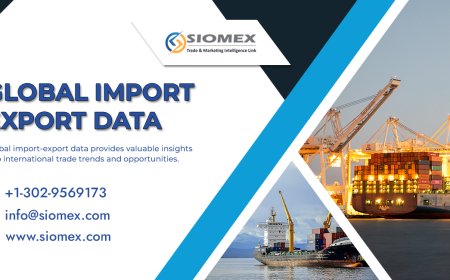Who Needs EPR for Plastic and How to Apply Legally
Your trusted guide to Plastic Waste EPR, registration process, filing returns & choosing the best EPR consultant in India.

In todays environmentally conscious world, managing plastic waste responsibly is more important than ever. Governments across the globe, including India, have introducedEPR for Plasticframeworks to ensure producers, importers, and brand owners (PIBOs) are accountable for the entire lifecycle of plastic packaging If you deal with plastic packagingwhether producing, importing, or sellingyou need to understandEPR for Plastic, how to register, and what it takes to stay compliant. This comprehensive guide will walk you through every critical detail, from understanding compliance norms to choosing the bestEPR Consultantfor your business.
What Is EPR for Plastic?
EPR for Plasticis a policy mechanism under thePlastic Waste Management Rules, 2016(amended in 2022), which mandates PIBOs to ensure environmentally sound management of plastic packaging. Under this rule, businesses are obligated to:
-
Collect plastic packaging waste generated by their products.
-
Recycle or co-process the collected waste.
-
FilePlastic EPR Returnannually to the Central Pollution Control Board (CPCB).
The aim is to reduce environmental damage and ensure manufacturers play an active role in post-consumer waste management.
Who Needs EPR Registration for Plastic?
You must obtainEPR Registration for Plasticif your business falls into any of these categories:
-
Producersof plastic packaging materials.
-
Importersof plastic packaging or products with plastic packaging.
-
Brand ownersselling products using plastic packaging.
-
Online marketplacesor e-commerce platforms using plastic materials for packaging.
Whether you're a large corporation or a small manufacturer, compliance is mandatory.
Types of Plastic Packaging under EPR Rules
The government classifies plastic packaging into four categories for compliance:
-
Category I Rigid plastic packaging.
-
Category II Flexible plastic packaging of single layer or multilayer (more than one layer with different materials).
-
Category III Multilayered plastic packaging with at least one non-plastic layer.
-
Category IV Plastic sheet or carry bags made of compostable plastics.
Every category requires distinct handling, recycling, and processing methods.
Why EPR Compliance for Plastic is Crucial
Failure to comply withPlastic Waste EPRregulations can result in penalties, business disruptions, and legal liabilities. Here are key reasons to ensure compliance:
-
Avoid Legal Penalties: CPCB may suspend operations of non-compliant entities.
-
Maintain Brand Reputation: Consumers prefer eco-conscious brands.
-
Gain Competitive Advantage: Early compliance signals responsibility and boosts credibility.
-
Business Expansion: Many e-commerce and export contracts demand proof of EPR compliance.
-
Supports Sustainability Goals: Contributes to Indias plastic recycling and waste reduction objectives.
Steps for EPR Registration for Plastic
To legally operate, every eligible business must obtainEPR Registration for Plasticthrough the CPCB's centralized online portal. Heres the step-by-step process:
1.Document Collection
Youll need the following:
-
Company PAN and GST
-
CIN and incorporation certificate
-
Authorized signatory details
-
Product details with packaging type and volume
-
Pollution NOC (if applicable)
-
Action plan for plastic waste collection and recycling
2.Category-Wise Declaration
You must declare the quantity of plastic packaging used/sold under each packaging category.
3.EPR Targets Submission
Submit annual collection and recycling targets based on your production/sales volume.
4.Plastic EPR Government Fee Payment
There is no direct registration fee, but CPCB may chargePlastic EPR Government Feesor require submission of bank guarantees depending on your category and compliance history.
5.Submission and Approval
Once submitted, CPCB will review and approve your registration, typically within 3045 days.
Annual Plastic EPR Return Filing
After registration, PIBOs must file annualPlastic EPR Returnto report the following:
-
Quantity of plastic introduced to the market
-
Waste collected and processed
-
Recycler details and certificates
Timely filing is crucial to maintaining your registration. Missing returns can result in cancellation or penalties.
Hiring the Right EPR Consultant Why It Matters
TheEPR compliance processinvolves technical paperwork, planning, and regular coordination with recyclers and CPCB. Thats why choosing theright EPR Consultantis essential. A reliable consultant can:
-
Draft your EPR action plan
-
Ensure accurate documentation and submission
-
Help you coordinate with recyclers/co-processors
-
Assist inPlastic EPR Returnfiling
-
Minimize risks of rejection or penalties
Looking for the Number 1 Consultant in EPR?
If you're seeking theNumber 1 consultant in EPR, youve come to the right place. Our expert team brings years of experience in helping businesses of all sizesfrom SMEs to multinational brandsobtainEPR Registration for Plasticand ensure smooth, error-free compliance.
We act as your dedicatedPlastic waste consultant, handling end-to-end services including registration, return filing, recycler tie-ups, and CPCB communications.
Understanding Plastic EPR Government Fee & Targets
Though theres no fixed fee for EPR registration, CPCB may:
-
Require performance guarantees for your waste targets.
-
Impose penalties if targets are missed.
-
Charge for non-compliance or late filing.
Our team provides transparent guidance on allPlastic EPR Government Feerequirements, helping you plan your finances and avoid surprise costs.
Responsibilities After EPR Registration
After successful registration, PIBOs must:
-
Fulfill annual plastic waste collection and recycling targets.
-
Upload recycler/co-processor certificates.
-
Submit proof of recycling or end-of-life disposal.
-
Maintain records for 5 years.
YourPlastic EPR Return Consultantplays a key role in ensuring these responsibilities are fulfilled accurately and on time.
Common Challenges in Plastic EPR Compliance
Businesses often face these hurdles:
-
Misclassification of packaging categories.
-
Rejected applications due to incomplete documents.
-
Difficulty finding CPCB-authorized recyclers.
-
Inaccurate return filing.
-
Delayed approvals or penalties.
Thats why having an experiencedPlastic Waste Consultanton your side is vital to avoid errors and delays.
Benefits of Partnering With an EPR Consultant
Partnering with a professionalEPR Consultantlike us provides:
-
End-to-End Management: From registration to annual return filing.
-
Risk-Free Compliance: Avoid rejections and fines.
-
Fast Processing: Accelerated approvals through accurate documentation.
-
Government Liaison Support: We handle all CPCB interactions for you.
-
Custom Strategies: Tailored plans based on your product and packaging volume.
How to Choose the Best EPR Consultant for Plastic Waste?
Before hiring, check for:
-
Experience in plastic EPR registration and returns.
-
Knowledge of the latest CPCB regulations.
-
Network of certified recyclers and co-processors.
-
Client portfolio in your industry.
-
Transparent pricing and scope of service.
We proudly rank among IndiasNumber 1 Consultant in EPR, offering reliable support to clients across FMCG, electronics, food, and e-commerce sectors.
EPR for Plastic A Legal and Environmental Necessity
Today, EPR compliance is not just a legal mandateits an environmental necessity. As plastic pollution grows, so does the responsibility of every stakeholder to ensure ethical waste disposal. By embracingPlastic Waste EPR, youre contributing to:
-
A cleaner environment
-
Improved recycling rates
-
Reduced landfill burden
-
Better brand perception
Plastic Waste EPR: Deadlines to Know
Here are important CPCB deadlines:
| Task | Deadline |
|---|---|
| EPR Registration | Before market entry |
| Annual EPR Return Filing | By 30th June every year |
| Performance Review | Yearly audits |
Missing deadlines may result in license revocation or fines. Stay ahead with expert guidance from yourPlastic EPR Return Consultant.
Get Started Today Trusted Plastic Waste Consultant
Struggling to understand your plastic EPR obligations? Let the experts handle it for you. Whether you're a new business or need help with annual returns, our expertPlastic Waste Consultantteam ensures 100% CPCB compliance without the hassle.
Conclusion
As plastic waste continues to challenge our environment,EPR Registration Consultantstands out as a powerful step toward sustainability. By complying with EPR rules, your business not only avoids legal penalties but also strengthens its environmental commitment and brand trust. Whether you are a manufacturer, importer, or brand owner, timelyEPR Registration for Plastic, accurate return filing, and transparent documentation are critical to staying compliant. Navigating the regulatory landscape can be overwhelming, but with the rightEPR Consultantby your side, you can meet your obligations confidently and efficiently. Let the experts take charge of yourPlastic Waste EPRjourneyso you can focus on growing your business while fulfilling your environmental responsibility.Need support with EPR Compliance? Call us at +91-9560 935 898 for expert assistance from Indias leading Plastic Waste Consultant.
Frequently Asked Questions
1. What is EPR for Plastic and who needs it?
EPR for Plasticrequires producers, importers, and brand owners (PIBOs) to manage the plastic waste generated by their products. If your business deals with plastic packaging, you must register under the CPCBs EPR framework and fulfill recycling and waste management obligations.
2. How can I apply for EPR Registration for Plastic?
You can apply forEPR Registration for Plasticthrough the Central Pollution Control Board (CPCB) portal by submitting company documents, plastic packaging details, and an action plan. Its best to consult a professionalEPR Consultantto ensure a smooth and error-free process.
3. What is the Plastic EPR Government Fee?
There is no fixed registration fee, but CPCB may imposePlastic EPR Government Feesin the form of performance guarantees, fines for non-compliance, or charges for failing to meet targets. Charges may vary based on your category and recycling strategy.
4. What documents are required for Plastic Waste EPR registration?
Key documents include PAN, GST, CIN, product packaging details, authorized signatory ID, and your EPR waste management plan. APlastic Waste Consultantcan guide you through compiling and submitting accurate documents.
5. Can I file EPR returns on my own?
Yes, but it's complex. The annualPlastic EPR Returnmust include detailed reporting on packaging volumes, recyclers, and certificates. Hiring aPlastic EPR Return Consultantensures timely and correct filing, preventing rejections or penalties.
6. What happens if I don't register under Plastic Waste EPR?
Non-compliance can lead to:
-
Cancellation of licenses
-
CPCB penalties
-
Restrictions on business operations
-
Loss of contracts with eco-conscious partners
Hence, compliance withEPR for Plasticis mandatory and legally enforced.
7. How can a Plastic Waste Consultant help my business?
An experiencedPlastic Waste Consultanthelps with:
-
End-to-end registration
-
CPCB communication
-
Document accuracy
-
Return filing
-
Target monitoring
They simplify compliance while saving you time and legal risk.
8. Is it necessary to hire the Number 1 Consultant in EPR?
While its not mandatory, working with IndiasNumber 1 Consultant in EPRensures your compliance is handled by professionals who understand CPCB requirements, manage risks, and get faster approvals through proven systems.








































